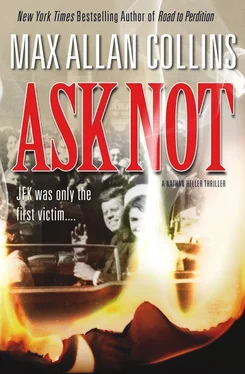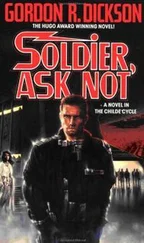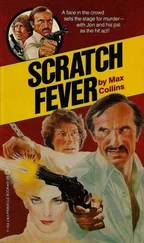On a more positive note, that concave front also allowed for a Vegas-like drive off Commerce Street, and I pulled my rental Galaxie in and got myself out. It was mid-morning, a sunny, pleasant day, not as humid as other trips of mine to Dallas. I had a room here that I hadn’t slept in for the last two nights.
That meant I was in the brown H.I.S. suit I’d worn interviewing Captain Peoples in Waco, not to mention during my dustups with Mac Wallace. So my clothing was a little ripe, even if I had showered occasionally over the past several days, though I hadn’t bothered shaving yet this morning. The doorman must have been used to eccentric Texan millionaires — they said H. L. Hunt went around in near rags — and gave me no attitude as I handed him my keys for the valet parking.
After wandering through an impressive lobby with atomic-design carpet and floating staircases, I selected an elevator in facing banks under a futuristic metal lighting grid, all very Buck Rogers, but on the rear wall was a map of Texas that seemed somehow a relic. The ride up was accompanied by Mantovani’s strings butchering “I Believe in You” — another of this hotel’s innovations, but not a welcome one: elevator music.
My room, 714, at first seemed to have no bed, just modern furnishings in rust, yellow, and brown (with matching abstract-shape drapes) dominated by a couch, which Detective Heller deduced was actually a twin bed with one side flush to the wall, along which propped-up cushions provided seating for two, facing the TV opposite.
I took a long, hot shower, letting the jetting water drill me like a friendly machine gun. First thing this morning, at my request, Janet had removed the adhesive strips that had mummied around me, supporting my ribs. The ER doc at Parkland had been good enough to have a sweet-looking young brunette nurse shave away the body hair before he’d applied the bandages. I’d been in so much pain, I barely noticed her.
So the strips had come off, and I was sore, but I was still on Demerol tablets, cutting the dose in half to keep me alert. And to make the pills last longer.
I finally shaved, splashed on some Prince Matchabelli aftershave (Black Watch), slipped into some dark-gray Jaymar Sansabelt slacks, a gray-striped Van Heusen shirt with a dark-gray narrow knit tie, and a Madisonaire sport coat from Lytton’s in Chicago.
I looked goddamn good and nowhere near my age, even if I did feel far older, the ribs aching, the bruising mercifully covered up. But I should pass muster with a certain very famous lady.
Not that I had a date lined up with her or anything. I just knew she was one of the other guests in another of the thousand rooms in the Statler. But this female was no stranger to me, and I knew she would just be getting around to breakfast about now — a quarter to eleven. And her breakfast would be a martini.
I can’t always be right — she was having a Bloody Mary.
In my defense, she had skipped breakfast and gone straight to lunch, a shrimp salad with Thousand Island dressing. She sat alone at a table for four, tucked in a corner of the vast and currently underpopulated Empire Room, the restaurant that converted to a showroom with name entertainment after dark. The furnishings were modern here, though the tables wore linen cloths, and the room was on the bright side, the partition walls bearing Mondrian-style plastic squares of color — red, aqua-green, black, white, yellow — like the Playboy Club’s sidewalk-spanning entryway.
I hadn’t seen her in two years but she looked just fine, if every year of her age — mid-forties — her brown hair in a forehead-baring bouffant, her nice slender shape in a piebald shift; she wore starry earrings and a single strand of pearls that was vivid against her alabaster complexion. No Texas sunning for her.
This was Flo Kilgore, New York Herald Tribune show-business columnist, nationally syndicated and a genuine household name, primarily due to her spot on the panel of What’s My Line? , the hit Sunday night game show.
Flo glanced up at me with blank disinterest on her heart-shaped face, apparently assuming I was a waiter, then her big blue eyes widened and brightened, her cheeks dimpling, her smile pretty and dazzling white, if thin-lipped, over her only bad feature, the weak chin that Frank Sinatra and Johnny Carson made such cruel fun of.
“Nate! You’ve been on my mind!” She scooched her chair back and got to her feet, holding out arms with white-gloved hands. “Have I conjured you?”
I gave her a kiss on the cheek and a hug, and took the chair next to her that she gestured to as she settled back in.
“No magic involved,” I said. “I’m just wrapping up a job. Figured on heading back to Chicago this afternoon.”
She reached out and held my right hand with both of her gloved ones. “I wish you’d stay! There’s something you could help me with.”
“Really?”
Though there were no other patrons within a dozen tables of us, she leaned forward and whispered confidentially, “It’s the biggest story of my career. Scoop of the century.”
“What, are Liz and Dick splitting up?”
“Don’t be mean. Anyway, I’m off the Hollywood beat and back on Broadway where I belong.”
“Dallas isn’t Broadway.”
“No, but it’s home to the story that’s going to net this little Indiana girl a Pulitzer. I already have a book contract from Bennett.”
She meant Bennett Cerf, publisher of Random House, her fellow game-show panelist.
I said, “Why were you thinking about me, of all people?”
“Two reasons, really. One is for a favor, which is to ask you to contact a friend of yours.”
“Who?”
She raised a gloved hand, like a prim lady traffic cop. “Not yet. You need background first. But the other is to see if I can hire you.”
“For what?”
“For a bodyguard.”
“One of the things I’m known for,” I said, arching an eyebrow, “is famous clients of mine who’ve been killed, despite my best efforts. Amelia Earhart, Sir Harry Oakes, Mayor Cermak, Huey Long...”
“Judging by those last two,” she said coyly, “you must be something of a expert in the realm of political assassination.”
She had no idea that I was way ahead of her on that mysterious scoop she was dangling.
I asked, “Why would you need a bodyguard?”
Now both white-gloved hands patted the air, like Jolson milking the audience for an encore. You ain’t heard nothin’ yet. “We’ll get to that, we’ll get to that... Why don’t you have some lunch, and afterward, we’ll talk business.”
A waiter came over and I ordered a steak sandwich, rare, cottage cheese, and a Coke, which arrived quickly, and Flo and I made small talk throughout lunch. She had a teenaged son and daughter, and of course I had Sam, so that carried us a while. Despite her upbeat mood, she revealed she’d been through some rough times of late.
Two of her various marriages had been to a former actor and sometime Broadway producer named Frank Felton. Two years ago she had married him a third time. Over the years, depending on whether they were hitched or not, they had a sporadic radio show, Breakfast with Flo and Frank (the martinis and Bloody Marys going unmentioned) on WOR in New York. They’d also had one of the first open marriages I ever heard of, but that hadn’t kept them from getting divorced twice. Her other marriages had been to younger men, both pop singers, one famous, one not.
“I’ve been burning the candle at both ends,” she admitted. “Booze and pills... like poor Marilyn.”
“Not exactly like poor Marilyn, I hope.”
“No. I wouldn’t say I’m that far gone. But since I saw you last, I’ve checked in three times at Leroy Hospital to wean myself off the goodies.”
Читать дальше












